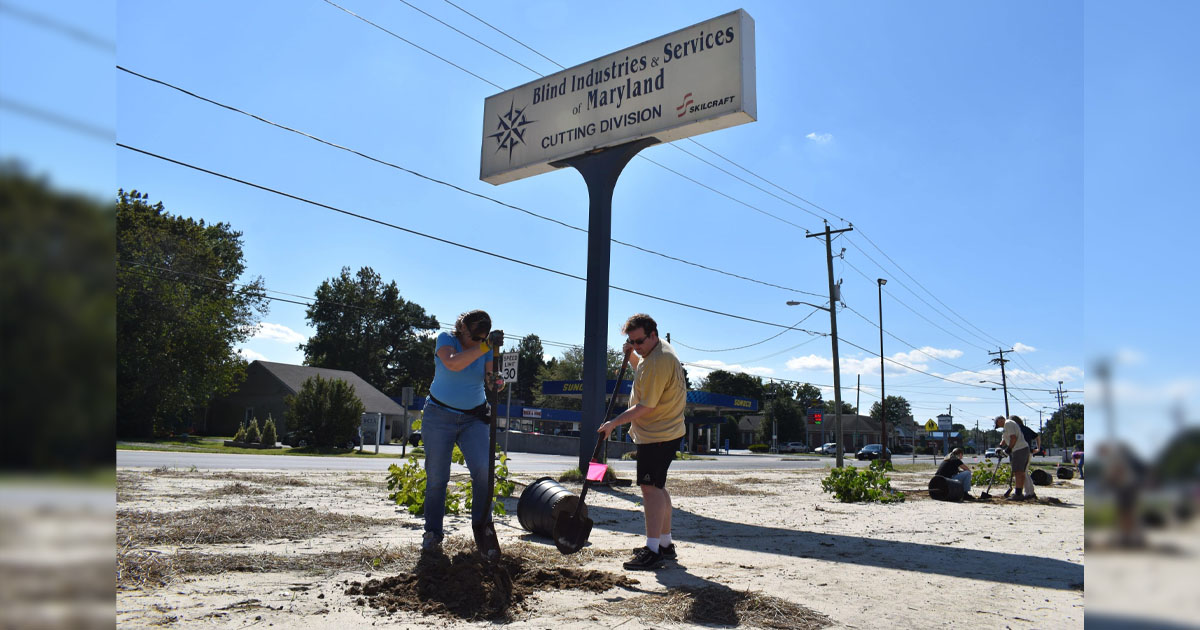Students in SU's Presidential Citizen Scholars Program Leave Their Mark
By SU Public Relations
SALISBURY, MD---Stepping on campus for their first year at college, most students know the next four years will be a transformative experience for them.
What they may not know is what kind of an impact they can make on others.
Recent graduate Charles Laird and seniors Bryce Machalek and Emma Tarquinio are seeing the fruits of their labor — and what kind of a mark they can leave — through the Presidential Citizen Scholars (PCS) program.
Through their capstone project, the trio partnered with non-profit Blind Industries and Services of Maryland (BISM) for a bioremediation project – removing asphalt, and beautifying part of the property – which not only will help BISM’s bottom line, therefore helping its constituents, but also assist surrounding residents, businesses and the environment. Their work is celebrated with a ribbon cutting for their project at BISM (1303 Old Ocean City Rd.) 4 p.m. Tuesday, September 26, in a ceremony open to the public.
“When I received the email about PCS, I was wondering if it was something for me,” said Machalek, a biology major from Potomac, MD. “I’ve always been told to jump at all your opportunities and try things out. I never would have imagined being able to do such a grand project as this.”
Spearheading a collaborative effort with the City of Salisbury and regional non-profit environmental leaders, the PCS scholars earned a nearly $5,000 grant from the Chesapeake Bay Trust, a grant from Lower Shore Land Trust, and a grant from ShoreCorps — SU’s AmeriCorps program — to focus on bioremediation in Salisbury to help protect the waters that run into the Chesapeake Bay.
Through the SU student team’s research and planning, the project resulted in the removal of 16,000 square feet of impervious surfacing at BISM, which was repurposed by a local pavement company to reduce waste. In-fill soil was added, the area was seeded with grass seed and white oaks were planted while rain barrels were installed to ensure rainwater from the roof helps to water the plants and grass.
“‘If we don’t do it, who will?’ has kind of been our mantra throughout this project,” said Tarquinio, a political science major from Frederick, MD. “BISM has a lot of impervious surfacing, and beautifying the space would also benefit them. Being a non-profit, they don’t have a lot of additional funds where they would be able to do this on their own.”
“Gray” infrastructure, such as parking lots and roadways, are impervious surfaces and the most common infrastructure built. These surfaces exacerbate the issue of urban runoff on the Delmarva Peninsula as excess oil, acids and sediment pollutants settle on roads, sidewalks, roofs and parking lots. These harmful materials then are washed into water drains and larger bodies of water through ditches, streams and rivers.
The impervious surfaces on the BISM site were contributing to excessive flooding in the area, something Laird was familiar with growing up in the Crisfield, MD. Flooding there happens due to its coastal geography, but the issue at BISM could be helped through the work of the PCS scholars.
“I’ve seen firsthand when it floods, houses are destroyed, cars are destroyed. It just ruins people’s lives and sets them back,” said Laird, a May graduate from SU’s Samuel W. and Marilyn C. Seidel School of Education.
“Maybe it doesn’t flood quite as often in Salisbury as it does in Crisfield, but to be involved in something that can help the community there, and BISM, I believe that would impact everyone on the Delmarva Peninsula. If everyone could see what we’ve done, that would just be one little straw of hay in the haystack of climate control and water levels rising.”
Laird, Machalek and Tarquino became a formidable team due to one of the keys of the PCS program – involving students from all disciplines across campus, with this project connecting students from three different schools.
BISM is dedicated to providing career and training resources to blind residents of Maryland. BISM employees focus on cutting and sewing textiles for uniforms. The site has a large amount of impervious surfacing because it was previously the location of a large home improvement store. The original development of the property has caused an inordinate amount of urban runoff and flooding on site and nearby.
In addition to its environment aspects, the project also will mean a financial benefit for BISM, which will see a reduction in its annual taxes for the reduced amount of impervious surfacing on its property.
And for the students involved, it’s a springboard into their future careers. Tarquinio explained the real-world experience she got in helping the environment and writing grant proposals. Laird is already planning to pass his newfound experience to the next generation.
“If you told me we would have done this when we first started, I would have told you, you were crazy,” said Laird who teaches fifth grade math and science in Somerset County. “But when we get to our unit in science on climate change and on the environment and environmental issues, the Education Department has taught me how to be a successful science teacher, and now I have real-world examples from my own experience with PCS that I can add to that conversation.”
The Presidential Citizen Scholars Program at Salisbury University is directed by Ryan Weaver, professor of interdisciplinary studies, for the Institute of Public Affairs and Civic Engagement (PACE). For more information about the PCS program visit its webpage.
Learn more about SU and opportunities to Make Tomorrow Yours at www.salisbury.edu.

